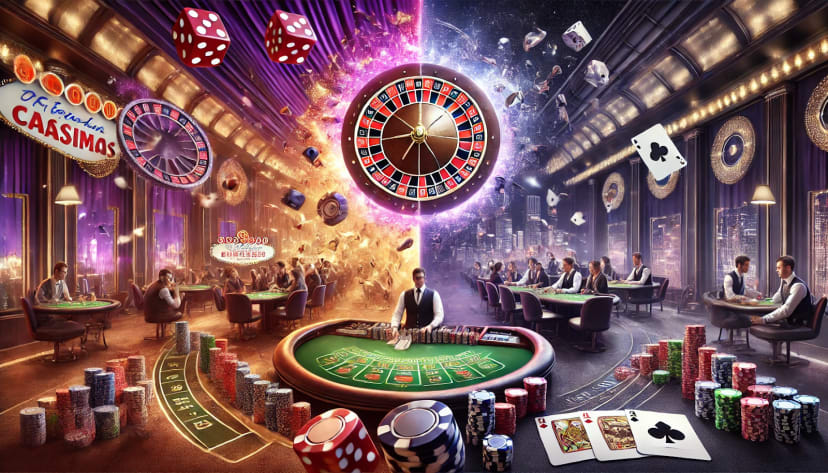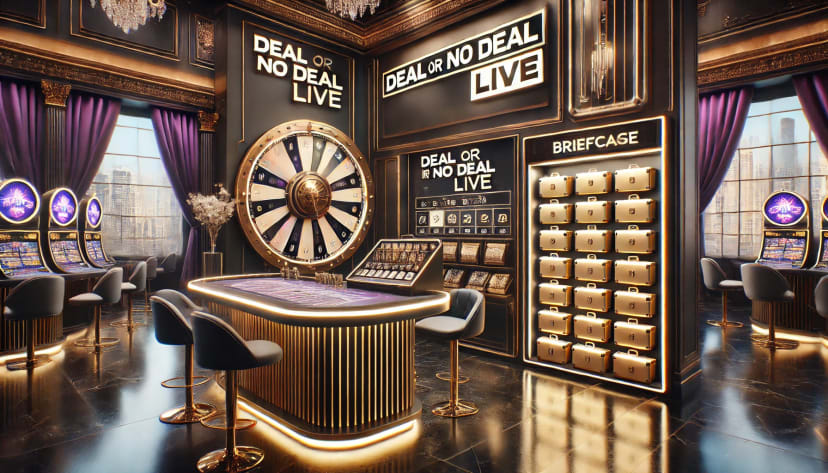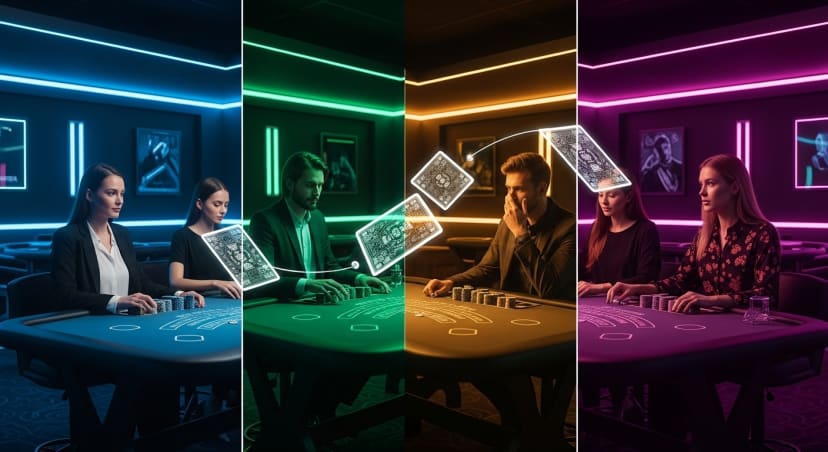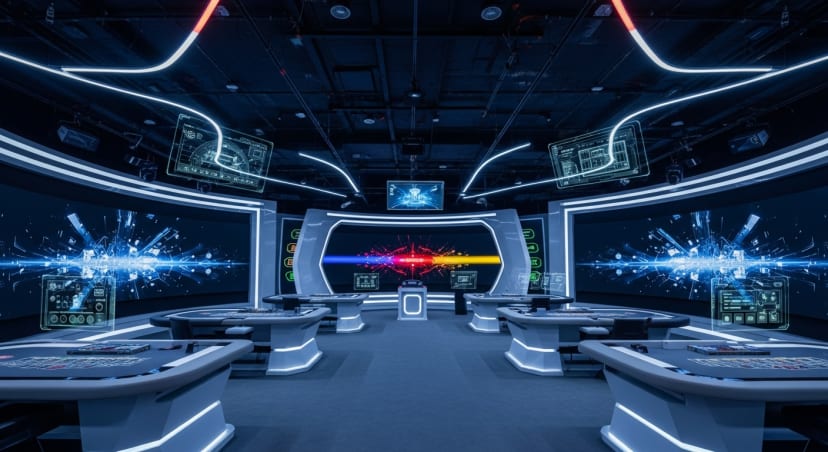Are Live Casino Games Threatening the Existence of RNG Games?

The online gambling scene in Singapore has seen a massive transformation over the last decade. What started out as digital versions of classic casino games using random number generators (RNG) has evolved into slick live-streamed games with real dealers and actual equipment. This isn't just a tech upgrade; it's a whole new way people are playing online, making us wonder about the future of the trusty RNG games that have been the foundation of online casinos since day one.
From RNG to the Thrill of Live Streaming in SG
The journey from simple RNG games to today's immersive live casino experiences has been paved by several tech breakthroughs. Early live dealer games popped up around 2003, but they were held back by slow internet speeds and basic streaming tech. The experience often felt laggy, with grainy video and frequent disconnections. Things are much smoother for players in Singapore now!
The evolution of live dealer tech tracks through these key stages:
- 2003-2006: First live dealer games appear with basic single-camera setups.
- 2007-2010: Multi-camera systems introduced, offering different viewing angles.
- 2011-2014: HD streaming becomes the norm as bandwidth improves.
- 2015-2018: Mobile optimisation enhances accessibility and the player experience.
- 2019-2022: Game show formats emerge, mixing live dealing with pure entertainment.
- 2023-2025: AR/VR integration starts, creating hybrid immersive experiences.
This progression has turned what was once a niche offering into a major player in the online gambling world accessible in Singapore. Today's live casino studios boast broadcast-quality production, multiple camera angles, and interactive features unimaginable in the early days of online gaming.
Why This Matters for Singaporean Players in 2025
The question of whether live casino games are taking over from RNG games has huge implications for the entire gambling industry here in Singapore. Market research shows that live dealer segments are growing at about 15% annually, compared to 7% for traditional RNG games. Major operators are dedicating up to 40% of their marketing budgets to live casino promotions in Singapore, showing a clear strategic shift.
Player preferences in Singapore have shifted dramatically too. Based on recent surveys:
- 62% of players under 35 prefer live dealer games over RNG options.
- Average session times are 2.3 times longer in live dealer settings.
- Average bet sizes are 30% higher for live dealer games compared to their RNG counterparts.
These trends mean operators are rethinking their game selections and where they invest resources. For tech providers and game developers, this influences R&D focus and product roadmaps. For regulators in Singapore, the rise of live dealer games brings new challenges in maintaining fair play and responsible gambling standards.
How Singaporean Players' Habits Are Changing: Engagement & Experience
Real Humans, Real Fun: Boosting Player Loyalty
Live casino games have truly spiced up player engagement through human interaction and authentic casino vibes. Players can actually chat with dealers and other players, adding a social layer that was missing from online gambling before. This tackles a major complaint about online gambling – feeling isolated compared to a real-life casino.
The effect of seeing physical cards dealt or a real roulette wheel spin is undeniable. Studies show Singaporean players trust live games more than RNG ones, with 74% feeling more confident in the fairness of live games, even though both are rigorously tested. This perception keeps players engaged for longer and builds stronger loyalty.
Live dealer providers have capitalised on this by improving dealer training. Dealers now get extensive coaching not just on game procedures but also on engaging with players, developing personalities and even brands that players follow.
Why RNG Games Still Shine: Convenience and Control for Singapore Players
Despite the boom in live casinos, RNG games still offer significant advantages in convenience and player control. These games run 24/7 without needing staff, meaning you can play your favourite titles anytime without waiting for a seat. The pace of the game is completely up to you – a big plus for many gambling fans in Singapore.
RNG games also score points for:
- Privacy and an anonymous gaming experience for those who prefer playing solo.
- Much faster gameplay, as there's no dealer pacing or waiting for other players.
- Lower minimum betting limits, making them more accessible to casual players
- Perfect for mobile play in situations with unstable internet connections
- Ability to play in practice mode before committing real money
These factors ensure that RNG games maintain a dedicated player base even as live casino options expand. For many players, particularly those seeking quick gaming sessions during commutes or breaks, the immediacy of RNG games remains compelling.
Game Design and Innovation Cycles
How Live Games Are Evolving Faster
The innovation pace within live casino formats has accelerated dramatically, outpacing traditional RNG development cycles. Game show hybrids like "Crazy Time" and "Monopoly Live" have created entirely new categories that blend gambling with entertainment elements reminiscent of television game shows.
These innovations extend beyond mere visual enhancements to include:
- Multiplier mechanics that dramatically increase potential payouts
- Bonus rounds requiring player decisions and interaction
- Augmented reality elements overlaid on physical game components
- Multi-game environments where players can participate in several games simultaneously
- Seasonal and themed limited-time versions of popular games
The production value of these offerings continues to increase, with Evolution Gaming's "Gonzo's Treasure Hunt Live" representing one of the first successful mergers of a popular RNG slot character with a live dealer format. This cross-pollination suggests that the boundaries between live and RNG games may become increasingly blurred.
Are RNG Games Stagnating or Adapting?
Contrary to assumptions that RNG games are stagnating, significant innovation continues in this space, albeit in different directions. The transition to HTML5 technology has revitalized older titles, making them compatible with modern devices and introducing new features impossible in earlier formats.
RNG innovation has focused on these areas:
| Innovation Area | Examples | Player Impact |
|---|---|---|
| Mechanics | Megaways, Cluster Pays, Infinity Reels | New ways to win beyond traditional paylines |
| Volatility Options | Player-selectable variance levels | Customized risk/reward profiles |
| Narrative Elements | Story progression, character development | Deeper player investment in game outcomes |
| Social Features | Tournaments, leaderboards, shared bonus rounds | Community engagement without direct interaction |
| Cross-platform Integration | Synchronized progress across devices | Seamless play transitions from desktop to mobile |
These developments demonstrate that RNG games are not standing still but evolving along a parallel track that emphasizes different player preferences and technological capabilities. The question remains whether these innovations can sustain player interest against the backdrop of increasingly sophisticated live offerings.
Platform and Operator Economics
Revenue Generation Per Player
The economic realities of live dealer versus RNG games present operators with complex considerations. Live dealer games generate significantly higher revenue per player, with average session values 2.7 times higher than comparable RNG alternatives. This revenue advantage stems from multiple factors including longer engagement times, higher minimum bets, and the psychological impact of social pressure when playing with real dealers and other participants.
Time-on-site metrics show particular divergence:
- Average RNG slot session: 18 minutes
- Average RNG table game session: 22 minutes
- Average live dealer session: 52 minutes
This extended engagement translates directly to higher revenue, with players making more bets over longer periods. Additionally, the immersive nature of live dealer games reduces the likelihood of players multi-tabling or splitting attention across multiple sites, keeping them focused on a single operator's offerings.
Cost to Host and Maintain
While live dealer games generate higher revenue per player, they also incur substantially higher operational costs. Maintaining live dealer studios requires:
- Physical studio space with sophisticated lighting and acoustics
- Broadcasting equipment and high-bandwidth streaming infrastructure
- Trained dealers working in shifts to provide 24/7 coverage
- Technical support staff to address real-time issues
- Game equipment maintenance and replacement
These expenses create a higher break-even threshold for live dealer games. In contrast, RNG games offer nearly unlimited scalability—once developed, they can serve millions of players simultaneously with minimal additional infrastructure costs. This scalability makes RNG games particularly valuable for smaller operators or those entering new markets where player volumes may initially be low.
Regulatory and Licensing Considerations
RNG Compliance and Certification
RNG games operate under well-established regulatory frameworks that have evolved over decades. These games undergo rigorous mathematical testing by independent laboratories like Gaming Laboratories International (GLI) and iTech Labs to verify randomness and expected return-to-player percentages.
The certification process typically involves:
- Source code reviews to identify potential vulnerabilities
- Statistical analysis of millions of simulated game outcomes
- Periodic retesting to ensure ongoing compliance
- Verification of game rules and paytable accuracy
This established framework provides regulatory clarity for operators and confidence for players. The mathematical nature of RNG testing also allows for precise calculation of house edges and volatility profiles, giving players transparent information about game characteristics.
Live Game Audits and Oversight
Live dealer games present unique regulatory challenges that have required adaptation of existing frameworks. Rather than focusing exclusively on random number generation, regulators must consider the integrity of physical equipment, dealer training, and real-time monitoring systems.
Regulatory approaches have evolved to include:
- Camera systems that monitor all dealer actions
- Automated card recognition technology to verify hand outcomes
- Regular physical inspection of equipment like roulette wheels and card shoes
- Dealer training certification and ongoing performance monitoring
- Incident response protocols for disputes or technical failures
These measures add complexity to compliance efforts but have proven effective in maintaining game integrity. Regulators in major jurisdictions now have specialized divisions focused on live dealer oversight, reflecting the growing importance of this segment.
Conclusion: Will RNG Games Survive the Live Casino Boom?
The evidence suggests that the future of online gambling will feature both live and RNG formats evolving in parallel rather than one replacing the other. The question is less about survival and more about adaptation and specialization. RNG games are likely to continue evolving toward experiences that capitalize on their unique strengths—privacy, pace control, complex mathematics, and unlimited scalability.
For players, this parallel evolution promises richer and more diverse gambling experiences. For operators, it necessitates sophisticated multi-product strategies rather than all-or-nothing bets on either format. The question is not whether RNG games will survive, but how both formats will transform as they respond to evolving player expectations and technological capabilities.
FAQ
What are Live Casino Games and How Do They Differ from RNG Games?
Live casino games bring the thrill of Marina Bay Sands to your screen with real dealers, cards, and live video. RNG (Random Number Generator) games use computer algorithms for random results. Live games offer a social, immersive experience, while RNG games are faster, more private, and convenient.
Are Live Casino Games Replacing RNG Games in Singapore?
No, live casino games aren't replacing RNG games, but they're a popular alternative. Live games are interactive and realistic, while RNG games are convenient, faster, and great for mobile play. Both types are evolving to suit different Singaporean players.
Why Do Players in Singapore Prefer Live Casino Games?
Singaporean players often prefer live casino games for their trustworthiness, realism, and social aspects. Seeing real dealers and physical cards builds confidence. This engagement leads to longer playtime and potentially larger bets. Remember to gamble responsibly.
How Are RNG Games Adapting to Stay Competitive in the Singaporean Market?
RNG games are innovating with new mechanics like Megaways, customizable volatility, and engaging storylines. HTML5 upgrades and cross-device compatibility ensure a modern experience for tech-savvy Singaporean players.
What Are the Financial and Operational Differences Between Live and RNG Games for Casino Operators?
Live games can generate more revenue per player due to higher engagement, but they also have higher costs for staff, studios, and streaming. RNG games have lower costs and are easily scalable, making them good for operators with smaller budgets or those targeting a broad audience.
















